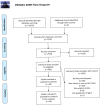The relationship between dairy products intake and breast cancer incidence: a meta-analysis of observational studies
- PMID: 34654387
- PMCID: PMC8520314
- DOI: 10.1186/s12885-021-08854-w
The relationship between dairy products intake and breast cancer incidence: a meta-analysis of observational studies
Abstract
Background: The effect of dairy products intake on breast cancer (BC) is highly controversial. This study aims to investigate the relationship between dairy intake and BC incidence.
Methods: A search was carried out in PubMed, EBSCO, Web of Science, and Cochrane Library databases before January 2021. The primary objective was the risk of BC and intake of dairy products were exposure variables.
Results: The meta-analysis comprised 36 articles with 1,019,232 participants. Total dairy products have a protective effect on female population (hazard ratio (HR) =0.95, 95% confidence interval (CI) =0.91-0.99, p = 0.019), especially for estrogen receptor-positive (ER+) (HR = 0.79, p = 0.002) and progesterone receptor-positive (PR+) BC (HR = 0.75, p = 0.027). For ER+/PR+ BC, there is a trend of protection, but it has not reached statistical significance (HR = 0.92, p = 0.075). Fermented dairy products can reduce BC risk in postmenopausal population (HR = 0.96, 95%CI = 0.93-0.99, p = 0.021), but have no protective effect on premenopausal population (HR = 0.98, 95%CI = 0.94-1.03, p = 0.52). Non-fermented dairy products have no significant effect on BC occurrence (p > 0.05). High-fat dairy products are harmful to women, without statistical difference (HR = 1.06, 95%CI = 1.00-1.13, p = 0.066). On the contrary, low-fat dairy products can protect the premenopausal population (HR = 0.94, 95%CI = 0.89-1.00, p = 0.048).
Conclusion: The intake of dairy products can overall reduce BC risk in the female population, but different dairy products have varying effects on different BC subtypes and menopausal status.
Keywords: Breast cancer; Dairy products; Meta-analysis; Risk assessment.
© 2021. The Author(s).
Conflict of interest statement
The authors declare no conflict of interest.
Figures
Similar articles
-
Long-term consumption of non-fermented and fermented dairy products and risk of breast cancer by estrogen receptor status - Population-based prospective cohort study.Clin Nutr. 2021 Apr;40(4):1966-1973. doi: 10.1016/j.clnu.2020.09.013. Epub 2020 Sep 17. Clin Nutr. 2021. PMID: 33004231
-
Dairy Consumption and Incidence of Breast Cancer in the 'Seguimiento Universidad de Navarra' (SUN) Project.Nutrients. 2021 Feb 21;13(2):687. doi: 10.3390/nu13020687. Nutrients. 2021. PMID: 33669972 Free PMC article.
-
Recreational physical activity and breast cancer risk by menopausal status and tumor hormone receptor status: results from the Nurses' Health Studies.Breast Cancer Res Treat. 2024 Jul;206(1):77-90. doi: 10.1007/s10549-023-07238-x. Epub 2024 Apr 9. Breast Cancer Res Treat. 2024. PMID: 38592542 Free PMC article.
-
Dairy consumption and risk of breast cancer: a meta-analysis of prospective cohort studies.Breast Cancer Res Treat. 2011 May;127(1):23-31. doi: 10.1007/s10549-011-1467-5. Epub 2011 Mar 27. Breast Cancer Res Treat. 2011. PMID: 21442197 Review.
-
Adult weight gain in relation to breast cancer risk by estrogen and progesterone receptor status: a meta-analysis.Breast Cancer Res Treat. 2010 Oct;123(3):641-9. doi: 10.1007/s10549-010-1116-4. Epub 2010 Aug 15. Breast Cancer Res Treat. 2010. PMID: 20711809 Review.
Cited by
-
The Role of Cow's Milk Consumption in Breast Cancer Initiation and Progression.Curr Nutr Rep. 2023 Mar;12(1):122-140. doi: 10.1007/s13668-023-00457-0. Epub 2023 Feb 2. Curr Nutr Rep. 2023. PMID: 36729355 Free PMC article. Review.
-
Common Misconceptions about Diet and Breast Cancer: An Unclear Issue to Dispel.Cancers (Basel). 2024 Jan 11;16(2):306. doi: 10.3390/cancers16020306. Cancers (Basel). 2024. PMID: 38254795 Free PMC article. Review.
-
Sex steroid hormone residues in milk and their potential risks for breast and prostate cancer.Front Nutr. 2024 Sep 2;11:1390379. doi: 10.3389/fnut.2024.1390379. eCollection 2024. Front Nutr. 2024. PMID: 39285863 Free PMC article. Review.
-
Adherence to the Dietary Approaches to Stop Hypertension diet reduces the risk of breast cancer: A systematic review and meta-analysis.Front Nutr. 2023 Jan 9;9:1032654. doi: 10.3389/fnut.2022.1032654. eCollection 2022. Front Nutr. 2023. PMID: 36698472 Free PMC article.
-
Skimmed milk intake reduces the risk of ER- breast cancer: a Mendelian randomization analysis.Discov Oncol. 2024 Nov 2;15(1):612. doi: 10.1007/s12672-024-01448-5. Discov Oncol. 2024. PMID: 39487869 Free PMC article.
References
Publication types
MeSH terms
Substances
LinkOut - more resources
Full Text Sources
Medical
Research Materials


